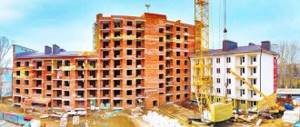What is shared construction?
Shared construction assumes that a construction organization (developer) attracts money from citizens (shareholders) during the construction process, paying construction costs with this money. In essence, the developer sells housing that has not yet been built in advance, which gives him the necessary financial resources to pay for construction work.
This type of construction has existed since the 90s of the 20th century, originally arose in Argentina, and became widespread in Russia in the late 1990s - early 2000s. Shared construction is considered a fairly profitable tool for both buyers and developers. Shareholders get the opportunity to buy housing at a relatively low price (at the construction stage), and the developer receives the necessary financial resources for construction and does not have to use loans (which, unlike contributions from shareholders, are issued at interest).
During the development of shared-equity construction in Russia, the legislative framework was imperfect, and stories about defrauded shareholders were not uncommon. Often, buyers were faced with both outright fraud (when, after collecting contributions from shareholders, no one was going to build a house) and failure to fulfill the terms of the contract (delays in deadlines, poor quality of constructed housing). There were cases when developers did not receive construction permits and, as a result, the construction site remained abandoned for years.
In order to resolve the problems of shared construction, Federal Law No. 214-FZ of December 30, 2004 “On participation in shared construction of apartment buildings and other real estate” . The law came into force on April 1, 2005.
However, this law did not immediately become the mainstay of relations in the field of shared-equity construction. Due to the fact that its standards were quite strict (especially at the time when the economy was experiencing the consequences of the crisis), not all developers formalized construction in accordance with 214-FZ. Numerous ways to circumvent the law have been found. Thus, until the beginning of the 2010s, about 90% of new buildings were sold through preliminary purchase and sale agreements and bill of exchange schemes. Because of this, the adoption of the law did not immediately solve the problem of defrauded shareholders.
Currently, most apartment buildings in Russia are built with the pre-sale of apartments in accordance with 214-FZ. The adoption of the law made it possible to consolidate the following basic provisions in the legal field:
- the requirements for the developer are clearly defined;
- the mandatory terms of the equity participation agreement have been determined;
- all rights and obligations of the parties are formalized;
- a requirement for compulsory insurance of shareholders was introduced;
- the provisions of state control of shared construction are determined.
After Law 214-FZ came into full effect, more and more buyers prefer to invest in housing at the construction stage. Until 2014, the dynamics of the number of equity participation agreements in Russia was sharply positive (graph).
(data: Rosreestr)
The crisis that began in 2015 also had an impact on the construction sector, but in 2021 the positive dynamics in the number of equity participation agreements in construction was again noticeable, because the housing problem does not lose its relevance.
What changes await us
Cancellation of DDU in 2021 means:
- For home buyers: reduced risk of buying square meters in a long-term or distressed building, lack of opportunity to participate as an investor and receive a discount when purchasing in the early stages of construction.
- For developers: the inability to use buyers’ money as an investment, the need for other sources of financing, a ban on the construction of several complexes at once.
Approximate procedure for financing the construction of a house:
- The company develops a project, calculates the cost of construction;
- Forms equity capital in the amount of at least 10% of the project cost;
- Applies to the bank for additional financing;
- The bank analyzes the requirements for the developer, the risks and benefits of the project, gradually issues money at a certain percentage, and controls its intended use;
- Citizens buy apartments and deposit money into an escrow account; no one can use them: neither a bank nor a developer.
- After completion of construction, the company draws up documents, buyers receive ownership of the apartments, part of the money from escrow accounts goes to repay the loan, and part goes to the developer’s account.
Advantages and possible risks of shared construction
With the entry into force of the aforementioned law 214-FZ, equity participation in construction has become one of the priority ways to finance new housing. Since the law protects the rights of shareholders, and the cost of real estate with shared participation is lower than for finished housing, many families choose this instrument.
Shared construction, if carried out in accordance with 214-FZ, has a number of advantages:
- Minimizing the risks of double sales of the same property. The law requires that each contract be registered with the Federal Service for State Registration, Cadastre and Cartography (Rosreestr). More than one contract for each object cannot be registered in Rosreestr; Moreover, upon delivery of the object and signing of the corresponding act, the apartment becomes the property of the shareholder.
- Strict requirements for the developer: the law requires mandatory approval of construction by all necessary authorities, therefore, upon completion of construction, if there are technical violations, the house will not be put into operation until they are eliminated.
- The rights of the parties to the equity participation agreement are protected in the event of its termination. In this case, the shareholder will be returned all the funds contributed by him, and if the termination is due to the developer’s failure to fulfill his obligations, a penalty may be collected from him. It is important to understand that the contract can also be terminated due to the fault of the shareholder, for example, if he did not make the appropriate payments on time.
- The law gives the shareholder the right, under certain conditions (several times a year), to allow late payment of his payments, with the payment of certain penalties. If the developer is late in delivering the property, a large fine will be imposed on him. Even if he notifies the shareholders in advance about the postponement of the delivery date of the object, he will pay a penalty. If the contract is terminated due to the fault of the developer, he pays the shareholder (individual) interest for the use of money - 1/150 of the refinancing rate of the Central Bank of the Russian Federation for each day of use (comprising 7.25% per annum).
- According to the law, the developer does not have the right to change the layout of the apartment and its price (except in emergency circumstances). The cost of an apartment may change downward if its area is smaller than specified in the contract.
In general, Law 214-FZ gives many advantages to shareholders, protects their investments and requires the developer to strictly follow the terms of the contract.
At the same time, do not forget about some disadvantages of shared construction:
- All of the above guarantees are valid only if the equity participation agreement is concluded in accordance with the law . Investment agreements, preliminary agreements, promissory notes and other guarantee schemes are not covered by 214-FZ;
- The shareholder also has responsibilities, the main of which is to adhere to the payment schedule and not allow delays for more than two months. Also, the shareholder cannot refuse the contract without sufficient grounds;
- if the developer goes bankrupt, a return of the deposited funds is possible, but it will require time and effort;
- There is no single form of a standard share participation agreement, so it is important to carefully read the draft agreement proposed by the developer.
To minimize possible risks, you need to check the terms of the equity participation agreement and make sure that it complies with all legal requirements.
Despite serious legislative guarantees, the problem of defrauded shareholders still exists. The main reason for non-compliance with the terms of the contract by developers is financial problems. This includes rising prices for building materials due to the rise in the dollar exchange rate, difficulties in obtaining bank loans to continue construction, and difficulties in putting houses into operation. According to official data, as of the 1st quarter of 2021, up to 30 thousand people are listed in the register of defrauded shareholders, and according to other data their number reaches 40 thousand; the number of problem objects exceeds 800.
When the law comes into force
Requirements for developers who could raise money under shared construction agreements became more stringent in the second half of 2021; new amendments to the Federal Law of the Russian Federation 2014 were adopted, which completely prohibit shared construction from 07/01/2019. What are the risks of such a change? After the amendments are introduced, buyers will be more protected, but now they need to be especially careful. Some developers may have started building as many houses as possible before the changes to the law were introduced; now their goal is to attract buyers to invest, luring them with low prices.
Drawing up a share participation agreement
The procedure for purchasing housing under shared construction conditions includes a number of stages:
- Collection of necessary documents.
- Contacting the developer, discussing the terms of the contract, signing a share participation agreement.
- Registration of the agreement in Rosreestr.
- Payment of the cost of the apartment in accordance with the agreement (or the bank will do this if the apartment is purchased on credit);
- After the completion of construction and commissioning of the house, the acceptance certificates for the apartment are signed.
- Registration of property rights and receipt of relevant documents.
To reduce the risks of shared construction, you should pay attention to the terms of the contract and their compliance with the requirements of Law 214-FZ.
The equity participation agreement (EPA) must contain the following clauses:
- contract price – the cost of the apartment;
- date of commissioning;
- the address where the house will be located;
- cadastral number of the land plot on which the house will be built;
- indication of the floor and preliminary apartment number;
- characteristics of housing - area, ceiling height, layout;
- quality guarantees: general warranty for the apartment for five years, warranty for engineering systems for three years;
- information on compulsory liability insurance for the developer;
- passport details of the buyer (shareholder);
- details of the developer (name, address, tax identification number, current account, etc.).
All these clauses of the contract are mandatory, as stipulated by Federal Law No. 214-FZ (Article 4).
Buying an apartment with an advance payment or in installments (if it is provided by the developer) does not require much effort. If the buyer is not married, he will only need a passport; if he is married, but wants to register the apartment only in his name, he needs to prepare the spouse’s consent to purchase the apartment (issued by a notary). When spouses buy an apartment together, they will need to provide their passports and marriage certificate.
It is a little more difficult to draw up an equity participation agreement if the apartment is purchased with a mortgage. Some developers have mortgage brokers who will select optimal lending conditions. If there is no such broker, you can collect the necessary documents yourself. In addition to the passport and marriage certificate, you will need copies of children’s birth certificates (if any), a copy of the work record book certified by the employer, and a certificate of income in form 2-NDFL (issued at the accounting department). The bank will need to draw up an application form for a mortgage loan according to the bank's form.
It is recommended that before signing an equity participation agreement, you consult with a lawyer and show him the draft agreement. A lawyer will help you decipher all unclear points and identify all the terms of the contract.
The rights of claim under an equity participation agreement can be transferred (assigned) before the date of its completion (commissioning and registration of property rights). In this case, the contract does not terminate; the buyer simply changes. All other conditions remain the same. If, at the time of transfer of the right of claim, payment for the property has not been made in full (in the case of an installment plan from the developer), the buyer of the rights passes the obligation to pay the remaining part. The assignment of claims is registered with Rosreestr, after which it will be necessary to notify the developer of such assignment. In some cases, the terms of the contract require that the assignment of claims be agreed upon with the developer.
Conclusions and forecasts
The law will bring positive changes to the construction market: the transparency of developers will increase, they will become more sustainable, the number of openly fraudulent companies will decrease, and affected shareholders will be able to get their money back through a special fund.
On the other hand, due to strict requirements, the law will reduce the number of construction companies and reduce competition in the market. The cost of additional housing may also increase and the overall volume of housing construction may decrease.
In this regard, the state has only one way - it will have to develop alternative types of construction with the help of project financing and investment funds.
How are the rights of a participant in shared construction protected?
The law generally protects the rights of shareholders, but there are still cases when construction is stopped and participants in shared construction receive nothing. To protect shareholders in accordance with the Federal Law of July 29, 2021 No. 218-FZ “On a public law company for the protection of the rights of citizens participating in shared construction in the event of the insolvency (bankruptcy) of developers and on amendments to certain legislative acts of the Russian Federation” was created Fund for the protection of the rights of citizens participating in shared construction.
The fund is designed to prevent the emergence of new defrauded shareholders; equity participation agreements registered after October 20, 2021 are under its protection.
The Fund's resources are formed from contributions from developers in the amount of 1.2% of the cost of each concluded share participation agreement, and contributions are mandatory and are transferred before registration of the agreement.
Payment of compensation in the event of bankruptcy of the developer is possible in two ways:
- return to citizen-shareholders of the funds contributed by them;
- completion of construction of the facility at the expense of the Fund.
The decision on which method to choose is made at a general meeting of participants in shared construction.
Before the creation of the Fund, the protection of the rights of shareholders was implemented through bank guarantees or through an insurance mechanism. However, with such options, it was not possible to complete the construction of objects after the bankruptcy of the developers, so the corresponding law on the Fund was adopted. At the same time, contracts concluded before 2021 are protected by insurance companies.
In addition to the ways to protect the rights of shareholders determined by law, it is recommended to adhere to the following rules:
- invest money only on the basis of an equity participation agreement drawn up in accordance with Law 214-FZ (other types of agreements do not have such guarantees);
- Before signing the contract, carefully read its contents and consult with a lawyer on unclear points. You can also search for information about the developer on the Internet;
- check whether the apartment has been sold to another person. Information can be obtained from Rosreestr;
- give preference to a large developer if possible. If problems arise with the completion of construction, the state will not be able to stand aside if a large number of shareholders suffer (as the SU-155 precedent showed).
Thus, the main recommendations are to carefully read the agreement before signing it and make sure that it complies with all legal norms.
Contents of the new law
New law on shared construction 2021, main changes:
- 1.2% of the price of apartments is transferred to the Fund for the Protection of Shareholders;
- The developer must be financially stable, without loan debts, and the share of own participation in the project must exceed 10%;
- It is necessary to confirm the right to lease or own a plot of land for construction;
- A legal entity-developer can engage in the construction of only one object and exclude other activities;
- To attract equity holders, the company must successfully build more than 10 thousand square meters. m of housing, and the share of such investments cannot exceed 30%;
- Project financing has been introduced for a separate facility, with the involvement of a bank, which analyzes the project in detail and monitors the progress of its implementation, since it is in its interests to repay the loan funds.
Latest changes in legislation
In the Russian construction industry in recent years, the problems of shared construction have been increasingly discussed. The state is seeking to move away from this form in favor of mortgage lending, considering shared construction a legacy of the underdeveloped construction market.
The latest changes to Federal Law 214-FZ were made as part of the “road map” for the transition from equity participation to the use of escrow accounts and the development of lending to developers. At the moment, the preparatory stage has been completed - a regulatory framework has been created for the transition to a target construction financing model. A transition period was announced until June 30, 2021, during which different construction financing models are possible.
The main innovation in the law is a change in the rules for raising funds from citizens (use of escrow accounts).
An escrow account is a special account in which funds raised from equity holders are accumulated until construction is completed. Such a system was introduced in Russia in 2014, but the first transaction with an escrow account was carried out only in April 2021. After the end of the transition period (July 1, 2021), developers will be able to raise money from equity holders only into escrow accounts.
In this case, the money will be kept in trust by the bank. The developer will not be able to manage this money until the house is put into operation and at least one apartment is registered as the buyer’s property. Although the developer will not be able to use money from the escrow account, these funds can serve as collateral for lending. As a result, it is expected that developers will be able to attract construction loans at lower interest rates (the level of risk is minimal if there is high-quality collateral). It is important that the money of shareholders placed in escrow accounts in banks will be insured by the Deposit Insurance Agency, like other bank deposits.
Taking into account the new provisions of the law, shared construction using escrow accounts will actually not be shared construction. Since the developer will not have access to shareholders’ money and will build with his own funds or a loan, experts expect an increase in housing prices in new buildings after July 1, 2019.
Consequently, until July 1, 2021, the developer can choose between construction entirely through an escrow account and the usual shared construction. In the second option, several additional rules were introduced for developers in 2018:
- mandatory banking support;
- restrictions on a number of payments;
- more stringent requirements for developers.
Mandatory banking support applies to those developers who have not switched to using escrow accounts. Banking support assumes that for each construction permit, the developer opens a special bank account and places money raised from equity holders in this account. The bank will control all expenses financed by payments from shareholders. Moreover, if there are grounds, the bank will be able to refuse to carry out certain transactions.
Banking support, on the one hand, allows you to increase the financial stability of developers, but on the other hand, abuse and corruption are possible. It is possible that there may be a deliberate delay in the timing of payment approvals or an unjustified ban on transactions. As a result, due to the fault of the bank, construction may be stopped.
From July 1, 2021, certain restrictions on the operations of developers will also be introduced. Administrative and other similar expenses cannot be more than 10% of the total cost of construction of the facility.
These costs include:
- payment for bank services for maintaining a current account;
- remuneration of management personnel and employees, contributions to extra-budgetary funds;
- advertising costs;
- payment of utility bills, communications, rent, equipment of workplaces in the developer’s offices.
The bank will also monitor compliance with this norm.
The changes will also affect the requirements for developers. Amendments to Law 214-FZ provide for the following innovations:
- The concept of a “specialized developer” is introduced. This means that the construction organization has at least three years of experience in the construction of apartment buildings and has built objects with a total area of at least 10,000 square meters;
- requirements are introduced for the minimum amount of the developer’s own capital, which should not be less than 10% of the total cost of construction of the project. In addition to their own funds and the money of shareholders, developers received the right to attract non-bank loans in the amount of up to 20% of the project cost of the property;
- There can be only one developer per building permit (with the exception of complex development of the territory);
- Developers who violate construction deadlines will be denied access to new projects. For this purpose, a new basis is introduced for refusing to issue a statement of compliance. Now, if the developer has violated the deadlines for commissioning at least one facility for more than three months, he will not be able to obtain a conclusion on compliance;
- owners and beneficiaries of construction companies will be jointly and severally liable for damage caused to citizens (in this case, shareholders in the event of bankruptcy of the development company).
Also in 2021, a ban was introduced on raising funds from citizens through housing certificates, housing construction and housing savings cooperatives. An exception is made for housing construction cooperatives, which can be created to complete the construction of a facility if the developer goes bankrupt.
Shared construction in modern Russia: problems and prospects
Bibliographic description:
Lebedev, M. D. Share construction in modern Russia: problems and prospects / M. D. Lebedev, S. A. Savvoev. — Text: direct // Research of young scientists: materials of the VI International. scientific conf. (Kazan, January 2021). — Kazan: Young scientist, 2021. — pp. 33-39. — URL: https://moluch.ru/conf/stud/archive/357/15524/ (access date: 06/01/2021).
The article reveals the state of the institution of shared construction in Russia at the present stage, taking into account the existing advantages and disadvantages. Changes regarding the procedure for attracting funds by developers for construction, as well as problems arising in this case in the field of shared-equity construction and in the housing policy of the state are considered. An analysis of statistical data on the prospects for the development of the institution of shared construction in Russia is carried out. A solution to the problem of a significant increase in the costs of equity holders for the purchase of housing is proposed by providing funds in escrow accounts for the use of the bank with interest accruing to the equity holders for such use.
Key words: shared construction, agreement of participation in shared construction, project financing, developers, banks, escrow accounts.
Affordable housing today is a national project. The housing policy of the Russian Federation is focused on the development of residential mortgages and the modernization of the affordable housing market. Increasing the volume and pace of construction of apartment buildings on a shared basis contributes to the accomplishment of this task. The main idea of shared construction is to reduce the risks associated with the high costs of housing construction, as well as to provide favorable conditions for both participants in shared construction and developers.
Article 40 of the Constitution of the Russian Federation proclaims the right of everyone to housing. At the same time, state authorities and local governments encourage housing construction and create conditions for the exercise of the right to housing [4]. The main way to implement this personal constitutional right of citizens in modern Russia is the shared construction of apartment buildings and other real estate, which implies raising funds from citizens and legal entities on the basis of an agreement for participation in shared construction.
In accordance with this agreement, the developer undertakes to build (create) an apartment building or other real estate object within the stipulated period and, after receiving permission to commission the constructed objects, transfer them to the participant in shared construction, who, in turn, undertakes to pay the price stipulated by the contract and accept the object subject to permission for commissioning.
As a rule, citizens cannot afford to purchase a finished apartment in a new building by paying the full cost of the residential property. In this regard, construction companies provide the opportunity to purchase an apartment at the stage of design or construction of residential buildings, when their cost is lower than for apartments in completed buildings. That is why the agreement for participation in shared construction has become quite widespread among the population and construction companies.
The long-term practice of the existence of the institution of shared construction has shown that citizens prefer to enter into agreements for participation in shared construction and buy completely new apartments rather than purchase housing on the secondary real estate market. This is due to the following advantages of this type of agreement:
– it is possible to pay in installments in full for housing under construction;
– participation in shared construction allows you to get an apartment on the primary real estate market at a favorable price without additional investments for major repairs;
– the cost per square meter of housing is lower than on the secondary market, on average by 20–30%. Purchasing real estate has always required serious investments, and therefore any difference in price ultimately represents significant savings;
– when concluding an agreement for participation in shared construction, it is possible to choose the parameters of future housing.
Shared construction is of significant interest to the developer, as it allows him to effectively accumulate funds from a large number of participants in shared construction, forming financial assets sufficient for construction. This also determines the practical prevalence of this agreement.
Perhaps the only drawback of the housing acquisition mechanism under consideration is, oddly enough, the agreement for participation in shared construction, which had to be concluded with the developer. After all, as practice has shown, this agreement did not always guarantee the eventual receipt of long-awaited housing for its participants.
The solution to this problem required the legislator to scientifically rethink and concentrate on the rules governing relations arising from the agreement for participation in shared housing construction, as well as strengthening control over housing construction by the state.
As noted above, shared construction is a very effective tool for implementing housing policy in the state, as well as ensuring the rights of citizens to housing. However, it became such after the adoption of Federal Law No. 214 “On participation in shared construction of apartment buildings and other real estate and on amendments to certain legislative acts of the Russian Federation” (hereinafter referred to as Federal Law No. 214).
Before the adoption of this Federal Law, in practice, unfair actions on the part of developers often took place. The mechanism for regulating shared-equity construction within the framework of Federal Law No. 214 at one time successfully resolved a number of pressing issues, for example: “it eliminated the possibility of double sales, thanks to the mandatory registration of contracts, and made the market more transparent due to the developer’s obligation to publish the project declaration and all changes to it” [8 ].
Today, the institution of shared construction in the Russian Federation is again undergoing global changes. At the end of 2017, Russian President Vladimir Putin instructed the Government, together with the Central Bank, to prepare an action plan for the gradual replacement of shared construction with project financing. The main goal of the shared-equity construction reform is to reduce the number of defrauded shareholders who, according to the new mechanism, will stop risking their own funds, and the purchased housing will already be in a built house.
Changes in the field of shared-equity construction began on July 1, 2018, and the period until June 30, 2021 should be transitional, ensuring a smooth transition for participants in these relations to the new system.
The final transition to project financing for housing construction, which involves the construction (creation) of apartment buildings using bank funds, was carried out on July 1, 2019. From this date, the developer can attract funds from citizens only using escrow accounts specially opened in the bank for each shareholder. From the analytical materials of the Central Bank it follows: “Funds deposited in escrow accounts are made available to the developer only after completion of construction and registration of rights to the first shared construction project” [13]. Considering that opening accounts is impossible without the participation of the bank, the agreement for participation in shared construction will actually become a tripartite agreement in which the developer, the shareholder and the bank will participate.
The transition to a new system of financing housing construction using bank lending is the next step in the evolution of housing construction in Russia, which fully protects citizens’ funds, which will now be stored in special escrow accounts until the title to housing is registered.
At the same time, the new mechanism provides additional guarantees for participants in shared construction in the event of unforeseen circumstances. For example, in the event of bankruptcy of a developer, citizens will receive funds placed in escrow accounts in full, and the risks of losses in bankruptcy will rest with the bank that issued the construction loan. In the event of bankruptcy of a credit institution in which the funds of shareholders are stored, insurance of these funds in escrow accounts is provided by the Deposit Insurance Agency, by analogy with bank deposits [11]. At the same time, an additional guarantee is provided - an increased amount of funds in escrow accounts secured by insurance, which amounts to 10 million rubles.
A number of experts believe [5] that the transition from shared housing construction to project financing is real over the horizon of several years, but its impact is ambiguous. First of all, innovations will hit small and medium-sized businesses: the market will become larger, and only those developers who work with banks in terms of project financing and whom banks can trust will remain.
In relation to the changes being introduced in the field of housing construction, the head of Sberbank German Gref spoke as follows: “According to our estimates, approximately 30–35% of developers will not be able to receive loans because they do not meet any criteria. Under no circumstances should they be allowed to access citizens’ money. Citizens used to trust them and were deceived, but banks will not trust them” [9].
Based on this, for developers who do not have access to bank money, there seem to be two ways of further action: to become contractors and subcontractors for large participants in the housing construction market, or to completely leave the market. Thus, it can be assumed that these innovations will lead to monopolization and consolidation of the market, as well as an increase in real estate prices.
At the same time, apartment buildings, the construction permit for which was received before July 1, 2021 (provided that the number of concluded agreements for participation in shared construction is at least 10% of the total area of the objects specified in the project declaration, and the degree of readiness of the object is at least 30%) , will be built according to the previous mechanism, not requiring the opening of escrow accounts, but presuming such a right. This provision of the legislator is intended to ensure a smooth transition to the new system and weed out unreliable developers in advance.
The degree of readiness and openness of developers to carry out construction work according to the new rules, in our opinion, is reflected by the ratio of the number of shared participation agreements with the opening of escrow accounts (a developer who received the right to build before July 1, 2021, has the right to enter into shared construction agreements with the opening of escrow accounts) to the total number of equity participation agreements.
The number of concluded agreements for participation in shared construction, as well as the dynamics of its change for the period from the first half of 2021 to the first half of 2021, can be traced in the presented diagram (Fig. 1) [6].
Rice. 1. Number of agreements for participation in shared construction (thousand pieces)
At the same time, the number of open escrow accounts for settlements under agreements for participation in shared construction is only 10,091. Taking into account the number of agreements for shared construction concluded between July 1, 2021 and July 1, 2021, we find that on average only 1 out of 78 agreements consists of opening escrow accounts. There is a clear reluctance among developers to voluntarily switch to the new system.
This situation can be explained, first of all, by the fact that project (bank) financing is provided at 11–15% per annum, which, taking into account the duration of the projects, causes a serious overpayment of the loan for developers. However, such rates are maximum and are provided for the period when there are no funds of participants in shared construction in the escrow accounts. As sales grow and accounts are filled, the rate is expected to decrease to 4.5–6%, that is, the average rate for bank lending for shared construction will be 7–10%.
Since the beginning of 2021, there has been a noticeable increase in the area of apartments under construction. The main reason for this dynamics is the desire of developers, in connection with changes in the legislative regulation of shared-equity construction, to begin work on * the largest number of new facilities in order to be able to complete them according to the old rules [2].
Until now, the main source of financing for shared construction has been the funds of participants in shared construction (shareholders) attracted by developers (Fig. 2). However, over the next few years, this situation should change dramatically, which is due to an increase in the number of equity participation agreements with the opening of escrow accounts and the gradual displacement of agreements concluded under the old mechanism (Fig. 3) [7].
Rice. 2. Financing of shared construction in 2021 (%)
Rice. 3. Number of existing equity participation agreements (thousand pieces)
Credit organizations also responded to changes in legislation in the field of shared-equity construction and are ready to soon become the main source of financing for housing construction in the state.
If previously one could doubt the advisability of concluding an agreement for participation in shared construction due to the developer’s dishonesty with the funds raised from participants in shared construction, then according to the new rules for concluding such agreements, the developer will not be able to personally handle the funds of shareholders. This circumstance will certainly contribute to the growth of demand for concluding shared construction agreements and will accordingly increase the need of shareholders for mortgage loans for shared construction.
Analysts in the field of housing construction lending [3].
If earlier the question of the expected increase in housing costs did not find a confident answer, now there is no longer any doubt about it. The actions of credit institutions to reduce mortgage rates only confirm this conclusion, because otherwise many citizens will not be able to afford to buy an apartment at the new prices.
In the process of studying the problem under consideration, it was found that changes in legislation have significantly increased the requirements for those developers who will carry out construction using the new system. This situation is determined, in our opinion, by the legislator’s desire to remove unreliable developers from the shared-equity construction market, thereby ensuring its reliability both for credit institutions financing construction and for shareholders.
In confirmation of the above, along with these innovations and the emergence of the obligation to open escrow accounts, the number of bankrupt developers has also increased. From January 1 to September 10, 2021, 133 bankrupt developers were identified in Russia, who together are building 709 houses with a total living area of 2.95 million square meters. m, says the report of the Construction Industry Rating Agency (RASK). This statistics is comparable to the number of bankrupts for the entire 2021, when 111 developers went bankrupt. Among the bankrupts of 2021, the vast majority are small developers with no more than four houses under construction [1].
Thus, shared construction at the present stage is undergoing significant transformations. It is difficult to say unequivocally that the adopted innovations will have a positive impact on the housing construction market, however, a number of positive and negative trends can be identified for all its participants.
Among the positive consequences of reforming the institution under study are:
1) minimizing risks for shareholders investing their money in shared construction at the initial stage. These funds are securely stored in escrow accounts in banks and are transferred to the developer only after completion of construction and registration of rights to the first shared construction project. At the same time, their compulsory insurance is provided;
2) accelerated completion of construction work. The funds of participants in shared construction are “frozen” in escrow accounts for the construction period, which should encourage the developer to deliver the project quickly. In addition, given the developer’s use of funds provided by the bank, paying interest over a long period of time is extremely unprofitable for the developer;
3) ousting unreliable developers from the housing construction market. In our opinion, the new rules for shared construction will force unscrupulous developers to leave the market, which will reduce the risk of citizens being involved in fraudulent schemes.
In our opinion, the negative consequences of legislative innovations include:
1) the possibility of reducing the number of developers due to increased legal requirements in relation to them. Changes in the shared construction system may have an adverse effect not only on unscrupulous developers, but also on small construction companies. In our opinion, this consequence will clearly contradict the goals of the strategy of the housing sector of the Russian Federation, which consolidates the achievement of the level of housing construction - 120 million square meters. m. by 2024 [10];
2) the difficulty of developers adapting to the new rules of shared construction. Due to this circumstance, a decline in housing construction is expected by the end of 2021 - beginning of 2021;
3) the expected increase in housing prices in new buildings, due to the payment of interest to the bank by developers. By the end of 2019, the cost of residential premises on the primary market is expected to increase by approximately 20–30%.
At the same time, in order to solve the problem of a significant increase in the costs of shareholders for the purchase of housing on the primary market, it is proposed to make changes to the civil legislation of the Russian Federation regulating the sphere of shared-equity construction. In our opinion, it is necessary to supplement the Civil Code with a norm according to which shareholders, as participants in shared construction, will receive interest for the use of banks on funds held in escrow accounts in the amount of the weighted average interest rate with its transfer to a separate account of such shareholder on demand.
“Freezing” money in escrow accounts, in our opinion, is not economically feasible, due to the withdrawal of colossal funds from circulation for a long time. In this case, the shareholder must receive a certain benefit, in the form of interest, for providing his funds for use by the bank.
This innovation, in our opinion, in addition to protecting the interests of shareholders, will also encourage the latter to enter into shared construction agreements, which, in turn, due to growing demand, will lead to an increase in construction volumes and will allow achieving the goals envisaged by the housing construction strategy.
In general, the prospects for the changes carried out in the field of shared-equity construction are aimed at maximizing the protection of the interests of shareholders and revitalizing the real estate market. At the same time, the further development of the sphere of shared-equity construction in Russian legislation is of great importance, since it is a guarantee of the successful implementation of the state’s housing policy.
Literature:
- Vedomosti / Bankruptcies among developers have become more frequent // RASK. URL: https://rask.ru/news/vedomost-bankrotstva-sredi-zastroyshchikov-uchastilis/.
- Housing construction October 2021 Analytical note // Central Bank of the Russian Federation. URL: https://cbr.ru/Content/Document/File/84168/analytic_note_20191004_ddkp.pdf.
- Results of 2021 in the mortgage market // Metrium. URL: https://www.metrium.ru/news/detail/itogi-2018-goda-na-rynke-ipoteki/.
- Constitution of the Russian Federation of December 12, 1993 // Collection of legislation of the Russian Federation. - 2014. - N 31. - Art. 4398. (taking into account the amendments introduced by the Laws of the Russian Federation on amendments to the Constitution of the Russian Federation dated December 30, 2008 N 6-FKZ, dated December 30, 2008 N 7-FKZ, dated February 5, 2014 N 2-FKZ, dated July 21, 2014 N 11 -FKZ).
- Monopolization and rising prices. What will the refusal of shared housing construction lead to? // Delovoy Kvartal. URL: https://www.dk.ru/news/monopolizatsiya-i-rost-tsen-k-chemu-privedet-otkaz-ot-dolevogo-stroitelstva-zhilya-237092430.
- Total number of registered agreements for participation in shared construction // “EMISS” State Statistics. URL: https://www.fedstat.ru/indicator/38088.
- Passport of the national project “Housing and Urban Environment” (approved by the Presidium of the Council under the President of the Russian Federation for Strategic Development and National Projects, protocol dated December 24, 2018 N 16) // ConsultantPlus. URL: https://www.consultant.ru/document/cons_doc_LAW_319211/.
- Passport of the federal project “Mortgage” (approved by the minutes of the meeting of the project committee for the national project “Housing and Urban Environment” dated December 21, 2021 N 3) // Garant.ru. URL: https://base.garant.ru/72192510/.
- Forced betting. Banks announced loan conditions for developers // Business Petersburg. URL: https://www.dp.ru/a/2019/03/31/Stavki_po_prinuzhdeniju.
- Strategy for the development of the housing sector of the Russian Federation for the period until 2025 // Ministry of Construction of Russia. URL: https://static.consultant.ru/obj/file/doc/minstroj_strategia_211217.pdf.
- Federal Law “On insurance of deposits in banks of the Russian Federation” dated December 23, 2003 N 177-FZ // ConsultantPlus. URL: https://www.consultant.ru/document/cons_doc_LAW_45769/.
- Federal Law “On participation in shared construction of apartment buildings and other real estate objects and on amendments to certain legislative acts of the Russian Federation” dated December 30, 2004 N 214-FZ // ConsultantPlus. URL: https://www.consultant.ru/document/cons_doc_LAW_51038/.
- Financing of shared construction // Central Bank of the Russian Federation. URL: https://cbr.ru/analytics/finansirovanie-dolevogo-stroitelstva/.
Key terms
(automatically generated)
: shared construction, housing construction, participation agreement, developer, opening accounts, Russia, facility, equity participation, project financing, Russian Federation.
Further prospects for shared construction
As noted above, from July 2021 all developers will have to work through escrow accounts, which actually means a ban on “classic” shared construction. Since the new rules are expected to significantly increase housing prices in new buildings, it is expected that developers will attract as much shareholders' funds as possible under regular share participation agreements while this is allowed.
The Government and the State Duma clearly support the transition from shared construction to instruments accepted in foreign practice - mortgage lending and lending to developers. Unfortunately, although financial market conditions have stabilized in recent years, the cost of loans is still high. Considering that the interest rate on business loans, according to experts, is about 13%, the difference between the cost of an apartment “at the excavation stage” and in a commissioned building is 15-25%. Given the actual ban on shared participation in construction, price increases, according to market participants, could reach up to 30%.
The most expected consequences of the adoption of amendments to 214-FZ are the departure of small developers from the market due to difficulties in attracting borrowed funds, and, as a result, an increase in prices due to a decrease in supply on the market.
The regulations that have been in effect since 2021 will also have a negative impact on the market - not all developers meet the requirements, the introduced contributions to the Fund for the Protection of the Rights of Citizens Participating in Shared Construction will in fact be transferred to home buyers, and increased banking control may lead to failure to meet deadlines.
Despite the negative forecasts of participants in the construction market, it should not be ruled out that the deadlines for the mandatory transition to escrow accounts will be shifted if the market is not ready for them. The interests of the state can also be taken into account, because a possible decrease in construction volumes will lead to aggravation of the housing problem in the country.
Thus, the adopted amendments to the legislation in the field of shared-equity construction will significantly improve the protection of the rights of shareholders, but this will inevitably lead to an increase in housing prices.
What does this mean in simple words
Let us explain what the change in legislation will lead to in simple words:
- The risk of end consumers will be reduced:
- the purchase will be partially insured through the Shareholder Protection Fund;
- more stringent financing conditions will be applied to developers: one company will be able to engage in one project, the bank will analyze the risks when issuing a loan, the legal entity must have its own capital;
- there will be no need to sell as many apartments as possible at the foundation pit stage;
- some unscrupulous companies will not be able to fulfill the new financing conditions and will automatically be eliminated;
- Buyers' money will be held in special escrow accounts that will be frozen until construction is completed.
- An increase in housing prices is possible, since developers will not be able to use free funds from buyers, but will attract bank loans at a certain percentage. But over time, the price will be balanced by the state of demand for square meters.
- From an economic point of view, it will become unprofitable for the buyer to invest money at the construction stage, since there will still be no significant discount, since the money will be frozen and the developer will not be able to use it. But there is no real practice, and it is too early to draw conclusions. Perhaps companies will be interested in early sales, since banks will issue credit tranches as money accumulates in a special account. Or maybe, indeed, the price will be identical to the finished new building, and it is better to place the funds on deposit at interest for a couple of years.







